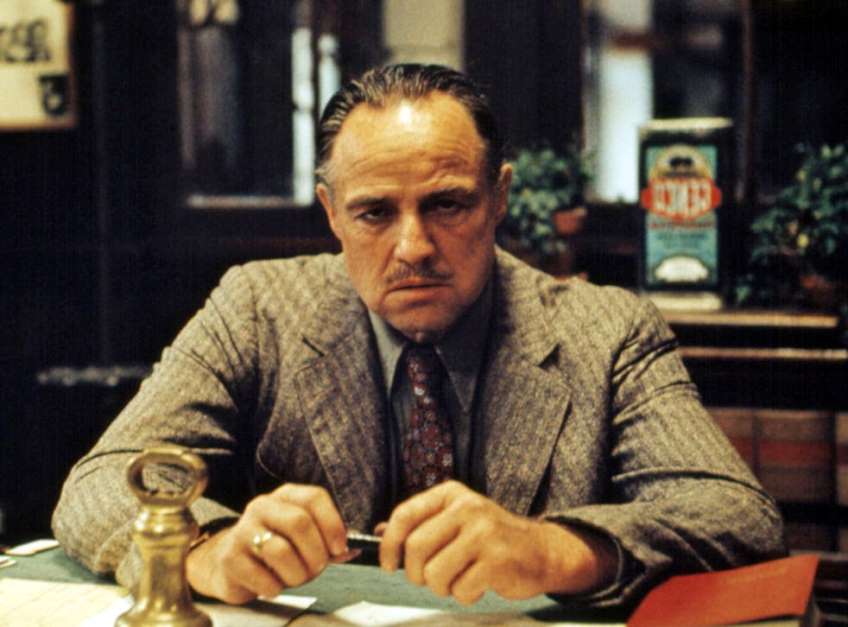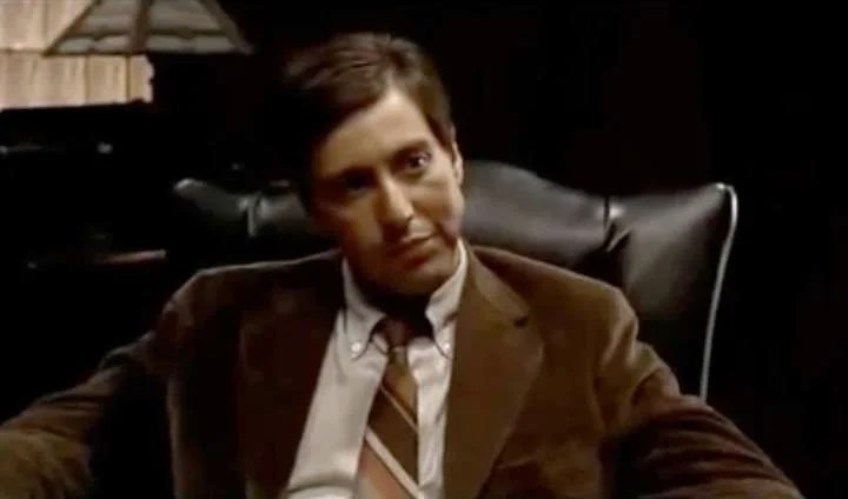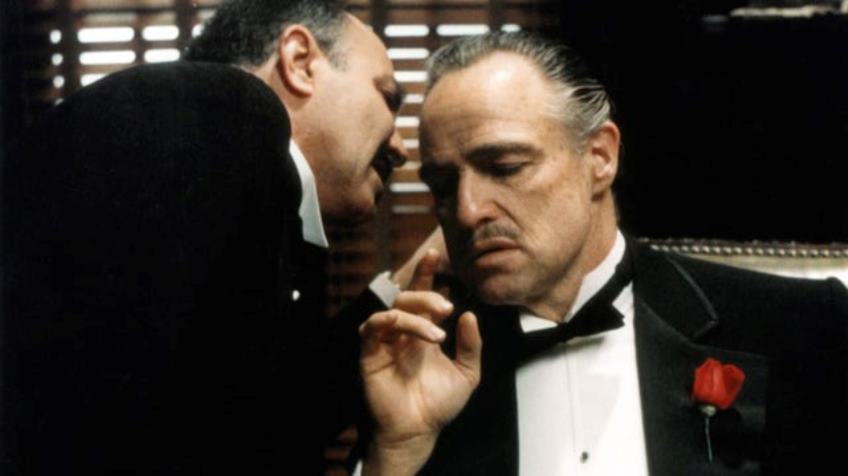Joyce Glasser reviews The Godfather – 50th anniversary reissue (February 25, 2022) Cert 15, 175 minutes
In 1972, a relatively unknown 29-year-old Francis Ford Coppola revolutionised the American gangster movie genre with his sombre, 3-hour family saga called The Godfather, an adaptation of Mario Puzo’s novel that had been at the top of the New York Times bestseller list so long any adapter faced a daunting challenge. The result, adapted by Puzo with Coppola, was one of the greatest movies of all time. Coppola went on to revolutionise mystery thrillers with The Conversation (1974); war movies with Apocalypse Now (1979); and the Coming-of-Age genre with The Outsiders (1983), but he will always be remembered for The Godfather trilogy.
From the mighty oak, many chestnuts have fallen, from Mean Streets, Goodfellas and Scarface to the 1978 TV series, Dallas, the Sopranos and Succession to The Irishman on the big screen. And that’s just the subject matter. Coppola’s style is so ingrained in the way movies have been made since 1972 that we cannot even recognise the influence. And a book could be written on the careers he made (Al Pacino, James Caan, Robert Duval, Robert de Niro) or remade (Marlon Brando).
The film has not dated even if you can’t help thinking that life would have been so much easier with mobile phones. A gorgeous new print was made for the 50th anniversary release, and details can only be discerned on the big screen.
The time flies by and the ending comes too soon. It’s not that you like the characters, it’s that Coppola draws you in, making you feel like a complicit insider, eager to follow the Godfather’s decision-making process and learn how he metes out justice.

Even the title deserves our attention. In the long wedding scene that opens the film, we meet the murmuring, authoritative Vito Corleone (Marlon Brando) as he throws a big party for his only daughter, Constance (Tahlia Shire) and her husband Carlo Rizzi (Gianni Russo). Rizzi will be brought into the family business but not as hoped. Crucially, we are also introduced to Vito’s youngest son, Michael ‘Mikey’ (Al Pacino, with only Panic in Needle Park to his name), still in military uniform as it is 1945 and the immigrant family has sent a representative to defend their new country.
Mikey brings with him his schoolteacher girlfriend Katherine (Kay) Adams (Diane Keaton). In attempting to explain the family business, Mikey uses a repeated euphemism, saying that his father is good at ‘mak[ing] people an offer they can’t refuse.’ He reassures her: ‘That’s my family, Kay. It’s not me.’ Over two hours later the dramatic look that passes between Mickey and Kay – the knife in the gut moment which ends the film – makes it clear neither of them believe that statement.
Santino “Sonny” Corleone (James Caan) is due to take over from his father (Brando was only 48 in the film, Caan, 32). With the intelligent, loyal, trusted Thomas “Tom” Hagen, the Corleone consigliere, or lawyer, and a couple of caporegime – or “captains” as well as Vito’s feared enforcer Luca Brasi (Lenny Montana), Vito wants his Michael to live. A middle son, Fredo (John Cazale), is not the brightest star in the Corleone firmament as we see when, after an assassination that is a big blow to the Corleone power struggle, Vito (who resists getting into narcotics) moves the business into gambling in Las Vegas, developed in the late 1950s for that purpose.
While the opening wedding serves as a deceptively joyous background, the main action is upstairs in Vito’s dark office where he and his council cabinet consider the request of a suppliant (Salvatore Corsitto) who has previously sought his justice through the American courts. Vito acts offended from a position of strength. People make appointments in the way courtiers made appointments with kings. Conversely, people are summoned if they are needed to return a favour or have transgressed.

The cutting back and forth between the festivities below and the sobering goings on above foreshadow another, more modest wedding celebration. When Michael is in hiding in the hilltop towns of Sicily, he falls in love with the tavern keeper’s beautiful young daughter, Apollonia (Simonetta Stefanelli). Both marriages are short lived and demonstrate how, in the patriarchal structure of the Corleone family, the women have no say or political position, but live with the real risk of collateral damage.
Another figure emerges from the wedding celebration whose adopted relationship to the Corleone family means that Vito reluctantly grants Frank Sinatra-type singer Johnny Fontane (Al Martino) a big favour. Johnny thinks his career would benefit from the lead in a film, but Hollywood producer Jack Woltz (John Marley) had chosen someone else. We see a display of how Vito makes someone an offer they can’t refuse in the “head-in-the-bed” scene that many will never have forgotten from 1972.
And that brings us to the cathartic set pieces that fit so organically into the drama that they are the culmination of equally gratifying tense lead ups to the event. Some will remember Carlo thinking he’s headed for Las Vegas (we know better by now) only to see his shoes breaking through the car windshield wipers. Others will point to the Las Vegas scene where upstart Mickey arrives in Vegas, clearing the room of call girls and getting right down to business. When Moe Green (Alex Rocco) tells a calm, composed Mickey that ‘the Corleone family is finished’ we know it’s not true.
Others will point to what has to be one of the most stylistically influential scenes in the film, when, in a brilliant act of strategic planning that the Harvard Business School would applaud, Mickey wastes no time responding to Vito’s warning that anyone who suggests a meeting with Barzini is out to betray him. Coppola cuts between the holy baptism of Connie’s new-born son, where Mickey is present as the boy’s Godfather, and Mickey envisioning his ruthless plan being executed.
My favourite is the scene in Louis’s Italian Restaurant in New Jersey where Mickey volunteers to meet with Sollozzo (Al Lettieri), and the corrupt police chief (Sterling Hayden) who are on his payroll. Sonny believes they targeted Vito in a failed assassination. We know what is supposed to happen as Mickey is well prepped by the caporegime. So we notice the slight deviation from the plan, which sends our adrenaline levels soaring, only for the cathartic impact to be all the more satisfying. For years after the film’s release, people feared sitting in white-table clothed Italian restaurants with their backs to the door.




